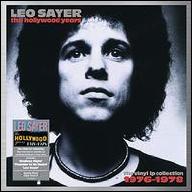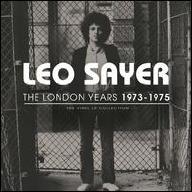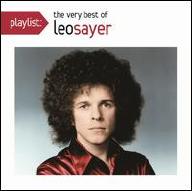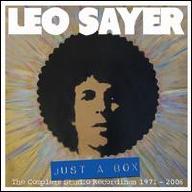Leo Sayer (born Gerard Sayer) had a string of highly polished mainstream pop hits in the late '70s. Sayer began his musical career as the leader of the London-based Terraplane Blues Band in the late '60s. He formed Patches with drummer
Dave Courtney in 1971;
Courtney had previously played with British pop star
Adam Faith.
Faith was starting a management career in the early '70s, so
Courtney brought Patches to his former employer in hopes of securing a contract. Patches failed to impress
Faith, yet he liked Sayer and chose to promote him as a solo artist. Sayer began recording some solo material written with
David Courtney at
Roger Daltrey's studio;
the Who's lead singer liked the Sayer/
Courtney originals enough to record a handful himself, including the hit "Giving It All Away." Sayer's debut single, "Why Is Everybody Going Home," failed to have an impact, yet 1973's "The Show Must Go On" hit number one in the U.K.; a cover by
Three Dog Night stopped Sayer's version from charting in the U.S. The following year he released his first album,
Silver Bird, followed quickly by
Just a Boy, which included two more British hit singles, "One Man Band" and "Long Tall Glasses (I Can Dance)"; "Long Tall Glasses" managed to break Sayer into the American Top Ten in early 1975. Sayer's working relationship with
Courtney was severed during the recording of his third album,
Another Year (1975). In 1976, he released
Endless Flight, which was co-written with former
Supertramp member
Frank Farrell; featuring the number one singles "You Make Me Feel like Dancing" and "When I Need You," the record became his biggest hit in both the U.S. and the U.K., selling over a million copies in America. Following
Endless Flight, Sayer became a fixture in the American Top 40, yet his hits began to dry up in England.
Sayer began the '80s with the American number two hit "More Than I Can Say," but it was his last big single in the U.S. His last chart entry in America was the early 1981 hit "Living in a Fantasy"; the U.K. hits didn't stop until 1983, after "Til You Come Back to Me" scraped the charts. After lying low for the rest of the decade, he attempted a comeback in 1990 with Cool Touch but it fell on deaf ears.
Sayer spent much of the '90s entangled in lawsuits, but he re-emerged as a touring act toward the end of the decade. The 1999 album Live in London captures this effort. Sayer's real comeback arrived in 2006, when DJ Meck remixed "Thunder in My Heart" -- it became a smash, reaching number one on the U.K. charts. This sparked a Sayer revival that was accompanied by hits compilations and an appearance on Celebrity Big Brother in 2007.
Sayer emigrated to Australia in 2005, becoming a full citizen in 2009. His new home saw the release of Don't Wait Until Tomorrow in 2008 -- it was the only country where the record was released -- and he worked in Australian film ads and television, while also touring regularly. Restless Years, a collection of new material, appeared in 2015, followed by Selfie in 2019. ~ Stephen Thomas Erlewine, Rovi


















